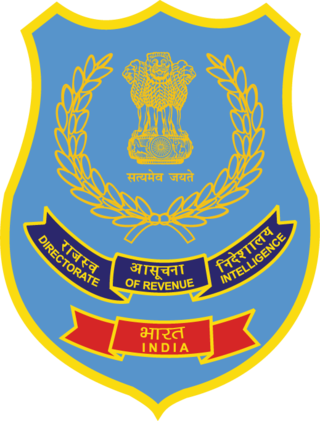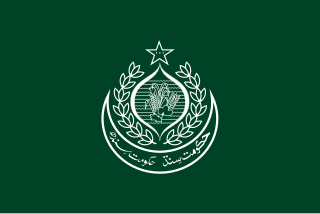
HM Customs and Excise was a department of the British Government formed in 1909 by the merger of HM Customs and HM Excise; its primary responsibility was the collection of customs duties, excise duties, and other indirect taxes.

The Government of India constitutionally known as the Union Government and also called the Central Government, is the national authority of the Republic of India, a federal republic located in South Asia, consisting of 28 states and eight union territories.

His Majesty's Revenue and Customs is a non-ministerial department of the UK Government responsible for the collection of taxes, the payment of some forms of state support, the administration of other regulatory regimes including the national minimum wage and the issuance of national insurance numbers. HMRC was formed by the merger of the Inland Revenue and HM Customs and Excise, which took effect on 18 April 2005. The department's logo is the Tudor Crown enclosed within a circle.

The district magistrate, also known as the district collector or deputy commissioner, is a career civil servant who serves as the executive head of a district's administration in India. The specific name depends on the state or union territory. Each of these posts has distinct responsibilities, and an officer can assume all of these roles at once. The district magistrate is primarily responsible for maintaining law and order, while the district collector focuses on revenue administration, and the deputy commissioner is in charge of overseeing developmental activities and coordinates government departments. Additionally, they also serve as election officers, registrar, marriage officer, licensing authority, and managing disaster responses, among other things. While the specific scope of duties may vary from state to state, they are generally similar. The district magistrate comes under the general supervision of divisional commissioner.

The United States Tax Court is a federal trial court of record established by Congress under Article I of the U.S. Constitution, section 8 of which provides that the Congress has the power to "constitute Tribunals inferior to the supreme Court". The Tax Court specializes in adjudicating disputes over federal income tax, generally prior to the time at which formal tax assessments are made by the Internal Revenue Service.

Cantonments in Pakistan are permanent military bases of the Pakistan Army, which are administered by Cantonment Boards under the control of the Military Lands & Cantonments Department (ML&C), Ministry of Defence, Government of Pakistan. Cantonments are established under and governed by the Cantonments Act 1924.

The Government of Sindh is the provincial government of the province of Sindh, Pakistan. Its powers and structure are set out in the provisions of the 1973 Constitution, in which 30 Districts of 7 Divisions under its authority and jurisdiction.
A Deputy Commissioner alias Superintendent alias Senior Superintendent a police, income tax or administrative official in many countries. The rank is commonplace in police forces of Commonwealth countries, usually ranking below the Commissioner.

The judiciary of Pakistan is the national system of courts that maintains the law and order in the Islamic Republic of Pakistan. Pakistan uses a common law system, which was introduced during the colonial era, influenced by local medieval judicial systems based on religious and cultural practices. The Constitution of Pakistan lays down the fundamentals and working of the Pakistani judiciary.

The Indian Revenue Service, often abbreviated as IRS, is a civil service that is primarily responsible for collecting and administering direct and indirect taxes. As a central civil service under Group A of the executive branch of the Government of India, it functions under the Department of Revenue of the Ministry of Finance and is under the administrative direction of the Revenue Secretary and the ministerial command of the Minister of Finance.
In Bangladesh, India, and Pakistan, a tehsildar, talukdar, or mamlatdar is a land revenue officer accompanied by revenue inspectors. They are in charge of obtaining taxes from a tehsil with regard to land revenue. A tehsildar is also known as an executive magistrate of the relevant tehsil. The immediate subordinate of a tehsildar is known as a naib tehsildar.

The Directorate of Revenue Intelligence (DRI) is an Indian intelligence agency. It is India's apex anti-smuggling intelligence, investigations and operations agency.
The Faisal Cantonment previously known as Drigh Road Cantonment is a cantonment town of the city of Karachi, in Sindh, Pakistan. It serves as a Pakistan Air Force base and residential establishment.
Ahmed Hussain A. Kazi Tamgha-e-Pakistan Award was a civil servant of Pakistan and senior advocate of the Pakistan Supreme Court, who shaped the internal revenue, economic and industrialization policies during the 1970s.

The Royal Malaysian Customs Department is a government department body under the Malaysian Ministry of Finance. RMCD functions as the country's main indirect tax collector, facilitating trade and enforcing laws. The top management of JKDM is led by the Director General of Customs and assisted by 3 deputies, namely, the Deputy Director General of Customs Enforcement/Compliance Division, the Deputy Director General of Customs Customs/Inland Tax Division and the Deputy Chief Director of Customs Management Division. The Royal Malaysian Customs Department consists of several divisions, namely the Enforcement Division, the Inland Tax Division, the Compliance Division, the Customs Division, and the Technical Services Division.

The Chairperson, Central Board of Direct Taxes (CBDT) is the senior-most IRS (IT) civil servant in the Government of India. The Chairperson of Central Board of Direct Taxes (CBDT) is the Special Secretary to the Government of India and also cadre controlling authority of the Indian Revenue Service.

District coordination officer (DCO) was the administrative head of the newly formed district and city district governments on 14-Aug-2001 in Pakistan and a senior officer belonging from the provincial or federal government service cadre. He was often denoted as ''Commissioner' in bureaucracy due to equivalent grade. The officer supervised the affairs of all the public offices and public facilities in the district or a city district for purposes of integrated development, efficient use of public resources and effective service delivery. The officer ensures that the standards set by the government in respect of a public facility are fully observed and supervises and coordinates the implementation of the policies, instructions and guidelines of the government.

The Commissioner Karachi Division is the top executive of the Karachi Division, overseeing all maters within the division. The position holder is a Grade-21 Officer who reports to the Chief Secretary and the Chief Minister. The position is deemed as one of the most important posts in Pakistan.

Provincial Civil Service of Uttar Pradesh (IAST: Prāntīya Civil Sevā, often abbreviated to as PCS, is the administrative civil service of the Government of Uttar Pradesh comprising Group A and Group B posts. It is also the feeder service for Indian Administrative Service in the state.

The Indian Revenue Service , often abbreviated to IRS (Customs&CentralExcise) or IRS (Customs&IndirectTaxes), now called IRS(Customs&GST) is a part of central civil service of the Government of India. It functions under the Department of Revenue of the Ministry of Finance and is under the administrative direction of the Revenue Secretary and the ministerial command of the Minister of Finance. The IRS is primarily responsible for collecting and administering indirect taxes accruing to the Government of India. It is one of the largest civil service amongst the organised civil services in the Indian government and serves the nation through discharging sovereign functions of collection of revenue for development, security and governance.















